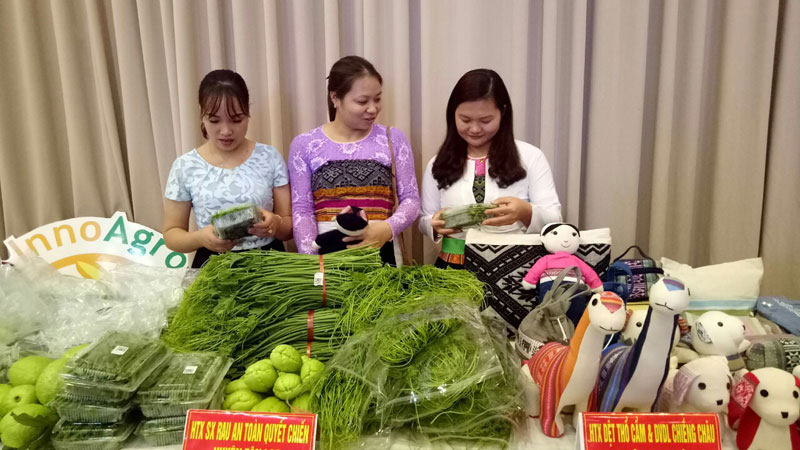
(HBO) - The preferential nature for the highland of Quyet Chien commune (Tan Lac) has made the chayote grow well, so the chayote is available all year round and it being confirmed as the safe vegetable in the market. Currently, the area of chayote trees in Quyet Chien commune is 60 hectares, mainly concentrated in Bu, Bac Hung and Ca hemlets. The households who cultivate a lot have from 1 to 2 hectares of chayote, and those who grow at least have 500 square meters of chayote.
![]()
The chayote products of the safe vegetable producing cooperative in Quyet Chien (Tan Lac), which are trusted by consumers, are promoted at fairs which are trusted by consumers.
The development of chayote is suitable in cool climatic conditions and it is easy to care for. It doesn’t have many pets, mainly using organic fertilizers without chemicals. This is a great advantage to compete with other vegetables. Quy Chien chayote is highly appreciated by consumers for its quality and it is crispier than the other chayote grown in other regions.
Due to the demand of the market and the demand for the legality, the households have gathered resources, land for production and the establishment of cooperatives in 2017 has marked the new development of the chayote, helping the output of chayote to be gradually stable with the competitive price, bringing good signals to the farmers.
With the safe quality of VietGAP, the sufficient labels and the packages, the products of the cooperative’s chayote have reached large markets, being favored by consumers. The major distribution units such as VinEco Agricultural Investment Development and Production Co., Ltd and some supermarkets, fresh vegetable shops in Hanoi Capital have been officially signing the orders. The clean vegetable products produced by the members are significantly improved in value thanks to VietGAP certification. The preliminary treated vegetables is sold to the cooperative with a price of 6,500 VND/ kg. During the 7 months of collection (from April to November), VietGAP chayote produces 63 tons/ ha with the average income of about 400 million VND / ha. The production and consumption of VietGAP vegetables of the cooperative are also stable, creating the confidence for the farmers in the production and attracting more and more members.
After participating in OCOP products, the cooperative wants to be supported to expand the area of planting chayote, applying VietGAP standard in production process and building a storage warehouse. At the same time, it is necessary to support the trade promotion and expand the market.
In Lac Thuy district, communes have been succeeded in promoting their One Commune-One Product (OCOP) products while others are still struggling to position their typical farming products in market. Some communes in the district still fail to have their products met OCOP programme’s requirements, while others have seen their certifications expired.
The inspectorate agency of Hoa Binh province has issued Official Dispatch No. 1090/TTr-PCTN to provincial departments, agencies, localities, business associations, enterprises, and investors regarding measures to improve informal component indexes of the Provincial Competitiveness Index (PCI).
Hoa Binh is taking concrete steps to improve its investment environment, with a strong focus on supporting businesses, settling obstacles for strategic investors, and creating opportunities for robust development in the coming years.
Under the blazing early summer sun, the construction site of Nhuan Trach Industrial Park (IP) in Luong Son district is abuzz with activities from dawn to dusk, a testament to the determination of the investor to meet their construction targets on schedule.



